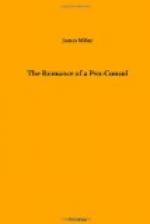With his military studies he combined others, working even to elucidate the Surrey remains of the Romans, whose glamour as rulers hit him.
IV SAXON AND CELT
Ireland, which has sent so many of her own sons across the sea, was to exercise a real influence upon the going of Sir George Grey.
He was, perhaps, in a special degree, kindly of thought and act towards Irishmen, fancying that as a race they had suffered, and liking their humour, buoyant against all odds. Several Irish political prisoners were released, after serving long sentences, and Sir George read an account, given by one of them, of the gaol experiences. Herein, complaint was made—of the distress caused by the flash-flash of the turn-key’s lantern, into the cells, all through the night. He went his rounds, and as he came to a cell door he flared his lantern inward by its little opening, making sure of the inmate. It was to the mind and nerves, what a red-hot wire would have been, driven into the body.
Next morning Sir George said, ’I could not sleep for thinking of that light, jab-jabbing the poor fellow in his cell. Nay, it appeared to be in my own bedroom, searching for my face and challenging me, “Are you there? Ha, ha, are you there?” What an eerie torture, to a slumbering soul, in that recurrent flame from the prison darkness! The thing stings and shocks me.’
It gnawed. His heart was full, and perhaps also his mind with the idea, ’Is it ours to impale the soul as well as the body of a fellow-creature? Surely that is reserved for a higher tribunal!’
The up-come of Ireland would provoke a story affecting Sir George Grey in a family sense. An ancestor, Ram by name, of his step-father had figured in a somewhat sudden meeting with Dean Swift. This was Sir George’s telling of it:
Dean Swift, in a modest phaeton, happened to be jogging past Gorey, the residence of Ram. At that moment, out of the gate drove the more imposing carriage of the latter, and there was a collision. The Dean and his phaeton were thrown into the ditch, but neither, by good luck, suffered hurt. Instead of uttering words, which even the cloth might not have suppressed in some, the witty Dean shot these lines at Ram’s apologetic confusion:
Here’s Ireland’s
pride and England’s glory
Upset by the great Ram
of Gorey.
The Ireland, to which Sir George’s military duties introduced him, might have driven laughter from all but Irishmen. Turmoil and discontent gripped the land; naked want was among the people.
The green island smiled winsomely in the Atlantic, only to belie itself as an abode of happiness. Its plaintive atmosphere wisped round Sir George Grey, as a mist enwraps two walkers on a Scottish hill-side, sending them silent. He was young, sensitive, sympathetic, and environment moulded him, as already it had done in the larger island, also with its suffering masses. Sir George had extracts of memory which afforded a vivid idea of Ireland in the early Thirties.




